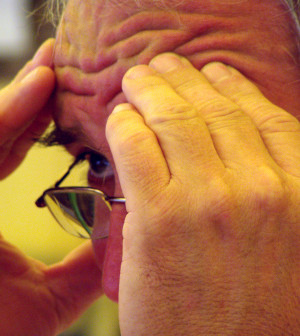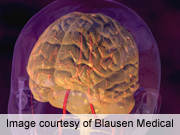- Double Mastectomy May Offer No Survival Benefit to Women With Breast Cancer
- Toxic Lead Found in Cinnamon Product, FDA Says
- Certain Abbott Blood Sugar Monitors May Give Incorrect Readings
- Athletes Can Expect High Ozone, Pollen Counts for Paris Olympics
- Fake Oxycontin Pills Widespread and Potentially Deadly: Report
- Shingles Vaccine Could Lower Dementia Risk
- Your Odds for Accidental Gun Death Rise Greatly in Certain States
- Kids From Poorer Families Less Likely to Survive Cancer
- Tough Workouts Won’t Trigger Cardiac Arrest in Folks With Long QT Syndrome
- At-Home Colon Cancer Test Can Save Lives
Both Sides of Brain Involved in Speech, Study Finds


Speech involves the use of both sides of the brain, according to a study that may overturn the widely held belief that only one side of the brain is used for this task.
The findings improve understanding of how speech is generated in the brain and could help lead to new ways to treat speech problems, the researchers said.
They noted that previous conclusions about speech were from studies that relied on indirect measurements of brain activity. This new study directly examined the link between speech and brain activity. Patients in the study had specialized electrodes implanted directly inside and on the surface of the brain.
The researchers focused on parts of the brain used during speech. The participants were asked to repeat two “non-words” — “kig” and “pob.” Using non-words to trigger brain activity enabled the researchers to isolate speech from language.
The results showed that the participants used both sides of the brain for speech, according to the study published Jan. 15 in the journal Nature.
“Now that we have greater insights into the connection between the brain and speech, we can begin to develop new ways to aid those trying to regain the ability to speak after a stroke or injuries resulting in brain damage,” study senior author Bijan Pesaran, an associate professor in New York University’s Center for Neural Science, said in a university news release.
“With this greater understanding of the speech process, we can retool rehabilitation methods in ways that isolate speech recovery and that don’t involve language,” he added.
More information
The U.S. National Library of Medicine has more about speech and communication disorders.
Source: HealthDay
Copyright © 2024 HealthDay. All rights reserved.










